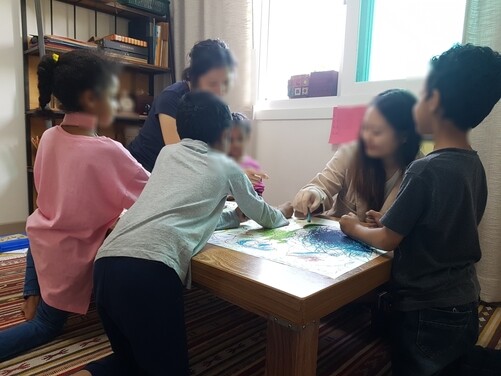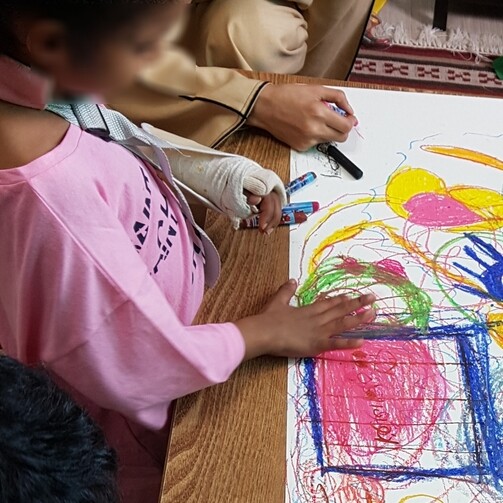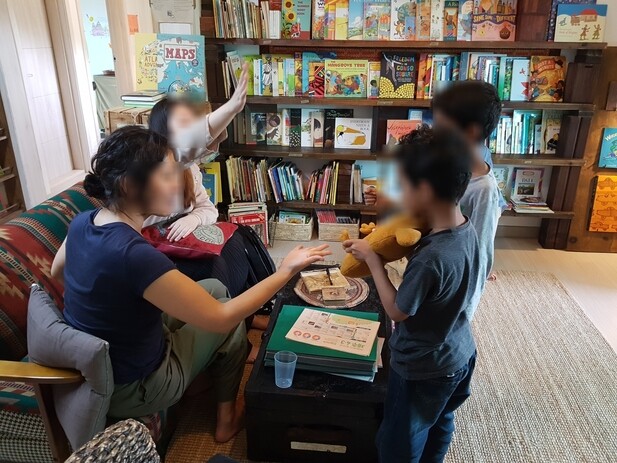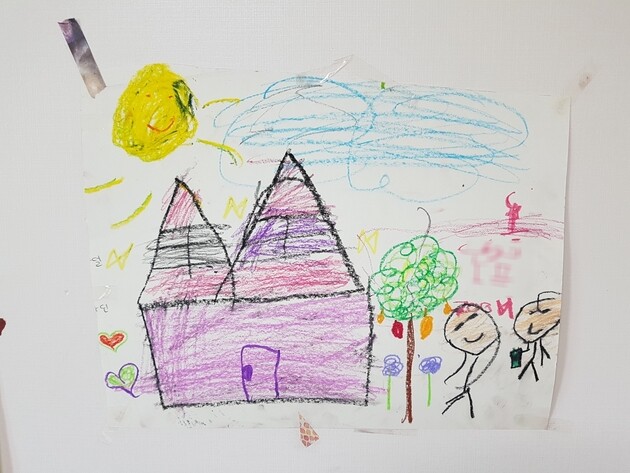hankyoreh
Links to other country sites 다른 나라 사이트 링크
[Reportage] Voluntary aid and support for Yemeni asylum seekers continue amid widespread distrust

On June 20, five siblings from Yemen gathered at a multicultural library on Jeju Island. The siblings are Lila, 20, the oldest; Karim, 9, who is sharp and observant; Miriam, 7, who has a cast on her left arm from a fall; Umar, 6, who always insists on riding in the front seat; and Fatima, 4, who is just as rambunctious as anyone her age. For the past ten days, the five of them have been staying in an apartment on Jeju with their father Mohammed, who is 37 years old. (All their names have been changed to protect their identities.)
Once a day, the five siblings visit the multicultural library for about two hours to learn about art and Korean. The class is part of a “makeshift school” that was put together by teachers at the multicultural library and an art therapist named Jeong Eun-hye, 47, who is helping Yemeni children. Despite the misunderstandings about and distrust of the Yemeni asylum seekers that are widespread in Korean society, voluntary experiments and efforts to achieve “coexistence” continue on Jeju Island.
A big sheet of drawing paper was sitting on the table in front of the five siblings. As the children doodled on the paper with crayons of various colors, Jeong (the art therapist) tried to read their psychology. As the children giggled, the lines and shapes they were randomly drawing soon filled up the sheet of paper. But Miriam’s painting was a little odd. Inside a blue square, she drew a set of red vertical lines and then wrote a word in Arabic inside. When I asked what she had drawn, Karim – who can speak a little English – piped up: “Prison!” The first thing that seven-year-old Miriam had drawn on the paper was a prison. When I asked why she had drawn that, Miriam just smiled but did not reply. “I often do art education, but it’s rare for kids her age to draw a prison,” Jeong said.
Muhammed, who had been an automotive engineer in Yemen, lost his wife in a shooting in 2015. Since then, he and his children have fled the battlefield, traveling through Saudi Arabia and Malaysia and finally reaching Jeju Island in May.

Jeong explains that her meeting with the family had been “spur of the moment.” “As an art therapist, I’m very interested in children, and I had heard that some of the Yemenis on Jeju Island were children. So I asked around and just showed up at their accommodations on the spur of the moment,” she said. Upon arriving, she showed the Yemenis there a rough Arabic translation of the message “I’m an art therapist and I want to help the kids,” which she had pulled from Google Translate. The Yemenis clustered around her and then took her into a small room in their accommodations. This was the first time that Jeong met Muhammed and his five children. “I don’t think I’ll ever be able to forget the moment the confused kids squealed with glee when they saw the drawing paper and crayons I was pulling out,” she said.
“I had no idea that something I had started almost on a whim would blow up like this,” Jeong said. The foreign community on Jeju, including teachers at language institutes, took it upon themselves to find a place for Muhammed’s family to stay and then helped them move. The Jeju families who took them in were “friends of friends” who had never met Jeong before. The class that Jeong and her friends are running also was sparked by the simple idea of giving the children a chance to get out and see people on a regular basis.

“There isn’t some organized group helping Muhammed’s family – we’re just random folks who were brought together in a moment by chance and good will,” Jeong said. That’s why she feels frustrated about claims that there are “refugee brokers” behind the Yemenis.
After art period was over, “A,” who runs the multicultural library, taught the children Korean. “Il, i, sam, sa, o, yuk, pal, chil, gu!” (1, 2, 3, 4, 5, 6, 7, 8, 9) – after over a week of studying Korean, it was easy for the children to chant the Korean numbers from one to nine. Class involved a game: cards with Arabic numerals were placed on the table, and when the teacher said a number in Korean, the kids would pick the right card. Even though the kids still got mixed up between “sam” (3) and “yuk” (6) and between “o” (5)” and “chil” (7), they shouted out the Korean numbers confidently and grabbed for the cards. After about a month in the country, the kids were slowly but surely learning Korean numbers, as well as Korean words such as “like” and “sad.”

But a project that began with positive feelings and good intentions has engendered some unexpected reactions. Before the issue became as controversial as it is now, “B” had gladly welcomed the families after hearing that Yemenis had come to Jeju to flee the war, but more recently her acquaintances have been expressing their concerns.
“Other mothers I know are really worried,” said B, a working mother in her thirties who recently gave birth. “Articles go up on social media and on online communities for mothers that incite fear about the Yemeni refugees. Friends who don’t know that a Yemeni family is living with us sent me a petition against accepting the Yemeni refugees.”
“I get that people feel nervous. I was the same way. But when you give kids baths together and share meals around the same table, you see that in the end they’re all just human beings. The only difference is that they fled a war,” B said.
Muhammed is looking for a job so that he can stay on Jeju Island a little longer. While Muhammed and his kids aren’t able to speak much English or Korean, there is one Korean phrase they have gotten pretty good at: “Thank you.”
“Muhammed and his kids are so grateful about the most trivial things that I feel guilty about them saying ‘thank you,’” Jeong said. When the children first arrived, she was worried about how subdued they were, but now they are gradually adjusting and starting to behave like normal children.
Jeong feels frustrated about how some are denigrating the courage of the ordinary people who did not hesitate according to their convictions. “When a house is on fire and there are kids screaming inside, you save the kids first and ask questions later. That’s kind of how my friends and I feel about this,” she said.
By Lim Jae-woo, Hankyoreh 21 staff reporter
Please direct comments or questions to [english@hani.co.kr]

Editorial・opinion
![[Editorial] Intensifying US-China rivalry means Seoul must address uncertainty with Beijing sooner than later [Editorial] Intensifying US-China rivalry means Seoul must address uncertainty with Beijing sooner than later](https://flexible.img.hani.co.kr/flexible/normal/500/300/imgdb/original/2024/0517/8117159322045222.jpg) [Editorial] Intensifying US-China rivalry means Seoul must address uncertainty with Beijing sooner than later
[Editorial] Intensifying US-China rivalry means Seoul must address uncertainty with Beijing sooner than later![[Column] When ‘fairness’ means hate and violence [Column] When ‘fairness’ means hate and violence](https://flexible.img.hani.co.kr/flexible/normal/500/300/imgdb/original/2024/0516/7417158465908824.jpg) [Column] When ‘fairness’ means hate and violence
[Column] When ‘fairness’ means hate and violence- [Editorial] Yoon must stop abusing authority to shield himself from investigation
- [Column] US troop withdrawal from Korea could be the Acheson Line all over
- [Column] How to win back readers who’ve turned to YouTube for news
- [Column] Welcome to the president’s pity party
- [Editorial] Korea must respond firmly to Japan’s attempt to usurp Line
- [Editorial] Transfers of prosecutors investigating Korea’s first lady send chilling message
- [Column] Will Seoul’s ties with Moscow really recover on their own?
- [Column] Samsung’s ‘lost decade’ and Lee Jae-yong’s mismatched chopsticks
Most viewed articles
- 1[Editorial] Transfers of prosecutors investigating Korea’s first lady send chilling message
- 2[Exclusive] Unearthed memo suggests Gwangju Uprising missing may have been cremated
- 3[Column] US troop withdrawal from Korea could be the Acheson Line all over
- 4[Column] When ‘fairness’ means hate and violence
- 5[Editorial] Intensifying US-China rivalry means Seoul must address uncertainty with Beijing sooner t
- 6‘Shot, stabbed, piled on a truck’: Mystery of missing dead at Gwangju Prison
- 7S. Korea “monitoring developments” after report of secret Chinese police station in Seoul
- 8China calls US tariffs ‘madness,’ warns of full-on trade conflict
- 9Seoul government announces comprehensive measures to prevent lonely deaths
- 10[Column] How to win back readers who’ve turned to YouTube for news